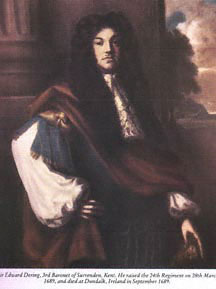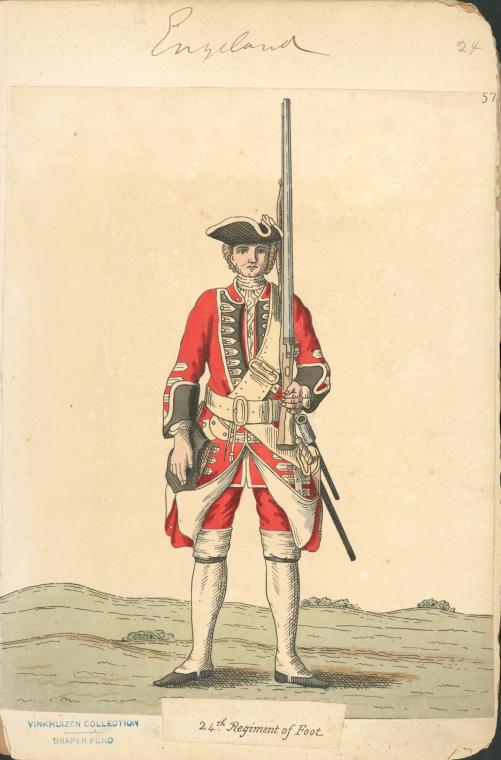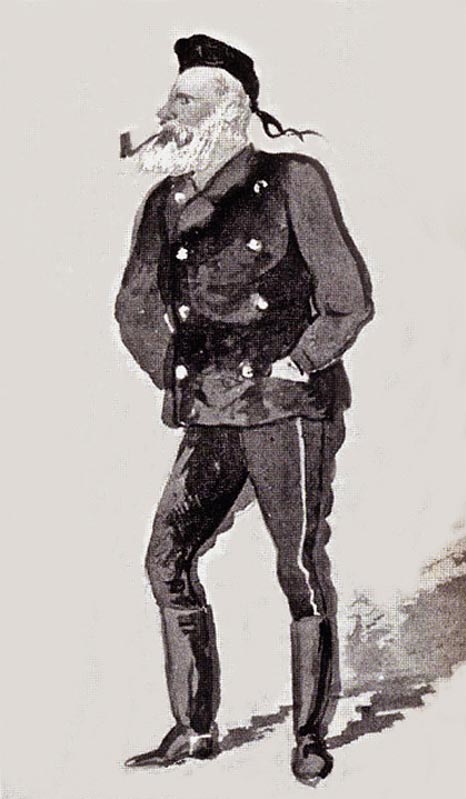|
Edmund Wodehouse (British Army Officer)
General Edmund Wodehouse (1819 – 1898) was a senior officer in the British Army. He was born the son of Edmund Wodehouse, the Member of Parliament for Norfolk. He joined the British Army as an ensign in 1837 and was progressively promoted lieutenant (1841), captain (1845), major (1851), lieutenant-colonel of the 24th Foot (South Wales Borderers) (1860), colonel (1862), major-general (1868), lieutenant-general (1880) and full general on 1 July 1881. He was placed on the retired list in July 1881. He was given the colonelcy of the South Wales Borderers The South Wales Borderers was a line infantry regiment of the British Army in existence for 280 years. It came into existence in England in 1689, as Sir Edward Dering's Regiment of Foot, and afterwards had a variety of names and headquarters. In ... in 1888, a position he held until his death in 1898. References {{DEFAULTSORT:Wodehouse, Edmund 1819 births 1898 deaths British Army generals South Wales Borderers ... [...More Info...] [...Related Items...] OR: [Wikipedia] [Google] [Baidu] |
British Army
The British Army is the principal land warfare force of the United Kingdom, a part of the British Armed Forces along with the Royal Navy and the Royal Air Force. , the British Army comprises 79,380 regular full-time personnel, 4,090 Gurkhas, and 28,330 volunteer reserve personnel. The modern British Army traces back to 1707, with antecedents in the English Army and Scots Army that were created during the Restoration in 1660. The term ''British Army'' was adopted in 1707 after the Acts of Union between England and Scotland. Members of the British Army swear allegiance to the monarch as their commander-in-chief, but the Bill of Rights of 1689 and Claim of Right Act 1689 require parliamentary consent for the Crown to maintain a peacetime standing army. Therefore, Parliament approves the army by passing an Armed Forces Act at least once every five years. The army is administered by the Ministry of Defence and commanded by the Chief of the General Staff. The Brit ... [...More Info...] [...Related Items...] OR: [Wikipedia] [Google] [Baidu] |
General (United Kingdom)
General (or full general to distinguish it from the lower general officer ranks) is the highest rank achievable by serving officers of the British Army. The rank can also be held by Royal Marines officers in tri-service posts, for example, General Sir Gordon Messenger the former Vice-Chief of the Defence Staff (United Kingdom), Vice-Chief of the Defence Staff. It ranks above Lieutenant-general (United Kingdom), lieutenant-general and, in the Army, is subordinate to the rank of Field marshal (United Kingdom), field marshal, which is now only awarded as an honorary rank. The rank of general has a NATO-code of OF-9, and is a four-star rank. It is equivalent to a Admiral (Royal Navy), full admiral in the Royal Navy or an air chief marshal in the Royal Air Force. Officers holding the ranks of lieutenant-general and Major-general (United Kingdom), major-general may be generically considered to be generals. Insignia A general's insignia is a crossed sword and baton. This appeared o ... [...More Info...] [...Related Items...] OR: [Wikipedia] [Google] [Baidu] |
Edmond Wodehouse (1784–1855)
Edmund Wodehouse (26 July 1784 – 21 August 1855), was a British politician. Background Wodehouse was the son of Thomas Wodehouse, younger son of Sir Armine Wodehouse, 5th Baronet and brother of John Wodehouse, 1st Baron Wodehouse. His mother was Sarah, daughter of Pryse Campbell. Political career Wodehouse entered Parliament as one of two representatives for Norfolk in 1817, a seat he held until 1830. Between 1835 and 1855 he was a Tory Member of Parliament (MP) for Norfolk East. Family Wodehouse married his first cousin, Lucy, daughter of Reverend Philip Wodehouse, in 1809. They had several children, including Sir Philip Wodehouse and General Edmund Wodehouse. She died in June 1829. Wodehouse remained a widower until his death in August 1855, aged 76. See also *Earl of Kimberley References * External links * * 1835 - 1855 * (as Edmund Wodehouse; marker correct) {{DEFAULTSORT:Wodehouse, Edmond 1784 births 1855 deaths Members of Parliament for Norfolk ... [...More Info...] [...Related Items...] OR: [Wikipedia] [Google] [Baidu] |
Norfolk (UK Parliament Constituency)
Norfolk was a County constituency of the House of Commons of the Parliament of England then of the Parliament of Great Britain from 1707 to 1800 and of the Parliament of the United Kingdom from 1801 to 1832. It was represented by two Members of Parliament. In 1832 the county was divided for parliamentary purposes into two new two member divisions – East Norfolk and West Norfolk. History Boundaries The constituency consisted of the historic county of Norfolk in the East of England, excluding the city of Norwich which had the status of a county in its itself after 1404. (Although Norfolk contained four other parliamentary boroughs – Castle Rising, Great Yarmouth, King's Lynn and Thetford – each of which elected two MPs in its own right for part of the period when Norfolk was a constituency, these were not excluded from the county constituency: owning property within a borough could confer a vote at the county election. This was not the case, though, for Norwich.) Franc ... [...More Info...] [...Related Items...] OR: [Wikipedia] [Google] [Baidu] |
24th Foot
The South Wales Borderers was a line infantry regiment of the British Army in existence for 280 years. It came into existence in England in 1689, as Sir Edward Dering's Regiment of Foot, and afterwards had a variety of names and headquarters. In 1782, it became the 24th Regiment of Foot, and had its depot in Warwickshire. Based at Brecon from 1873, the regiment recruited from the border counties of Brecknockshire, Monmouthshire, and Herefordshire. It was not called the South Wales Borderers until the Childers Reforms of 1881. The regiment served in a great many conflicts, including the American War of Independence, various conflicts in India, the Zulu War, Second Boer War, and World War I and World War II. In 1969 the regiment was amalgamated with the Welch Regiment to form the Royal Regiment of Wales. History Early history The regiment was formed by Sir Edward Dering, 3rd Baronet as Sir Edward Dering's Regiment of Foot in 1689, becoming known, like other regiments, by the ... [...More Info...] [...Related Items...] OR: [Wikipedia] [Google] [Baidu] |
South Wales Borderers
The South Wales Borderers was a line infantry regiment of the British Army in existence for 280 years. It came into existence in England in 1689, as Sir Edward Dering's Regiment of Foot, and afterwards had a variety of names and headquarters. In 1782, it became the 24th Regiment of Foot, and had its depot in Warwickshire. Based at Brecon from 1873, the regiment recruited from the border counties of Brecknockshire, Monmouthshire, and Herefordshire. It was not called the South Wales Borderers until the Childers Reforms of 1881. The regiment served in a great many conflicts, including the American War of Independence, various conflicts in India, the Zulu War, Second Boer War, and World War I and World War II. In 1969 the regiment was amalgamated with the Welch Regiment to form the Royal Regiment of Wales. History Early history The regiment was formed by Sir Edward Dering, 3rd Baronet as Sir Edward Dering's Regiment of Foot in 1689, becoming known, like other regiments, by the ... [...More Info...] [...Related Items...] OR: [Wikipedia] [Google] [Baidu] |
Charles Henry Ellice
General Sir Charles Henry Ellice (10 May 1823 – 12 November 1888) was a former Adjutant-General to the Forces. Life He was born at Florence on 10 May 1823, was second son of General Robert Ellice, the brother of the Right Hon. Edward Ellice, secretary at war, and Eliza Courtney. Military career Having passed through Sandhurst, Charles Ellice was commissioned into the Coldstream Guards on 10 May 1839. He served in Canada in 1840–2, and became lieutenant and captain on 8 August 1845. He exchanged to the 82nd foot on 20 March 1846, and to the 24th foot, of which his father was colonel, on 3 April. He went with that regiment to India in May, but was aide-de-camp to his father (commanding the troops in Malta) from 17 March 1848 to 3 March 1849, and so missed the second Sikh war. He was promoted major on 21 December 1849, and lieutenant-colonel on 8 August 1851. On 28 November 1854 he became colonel in the army. The 24th was at Peshawar when the Indian Mutiny broke out. On 4 Ju ... [...More Info...] [...Related Items...] OR: [Wikipedia] [Google] [Baidu] |
Richard Thomas Glyn
Lt Gen Richard Thomas Glyn (23 December 1831 – 21 November 1900) was a British Army officer. He joined the 82nd Regiment of Foot (Prince of Wales's Volunteers) by purchasing an ensign's commission in 1850. Glyn served with the regiment in the Crimean War and rose in rank to captain before transferring to the 24th (The 2nd Warwickshire) Regiment of Foot in 1856. He served with that regiment in the Indian Mutiny and was appointed to command it in 1872. In 1875 he accompanied the 1st battalion of the regiment on service in the Cape Colony and fought with them in the 9th Cape Frontier War of 1877–78. He was appointed a Companion of the Order of the Bath after the war. Glyn commanded No. 3 Column, including men from both battalions of his regiment, during the first British invasion of Zululand in 1879. Whilst Glyn was accompanying Lieutenant-General Lord Chelmsford on a reconnaissance, the column's camp was attacked and almost wiped out in the Battle of Isandlwana. Glyn comman ... [...More Info...] [...Related Items...] OR: [Wikipedia] [Google] [Baidu] |
1819 Births
Events January–March * January 2 – The Panic of 1819, the first major peacetime financial crisis in the United States, begins. * January 25 – Thomas Jefferson founds the University of Virginia. * January 29 – Sir Stamford Raffles lands on the island of Singapore. * February 2 – ''Dartmouth College v. Woodward'': The Supreme Court of the United States under John Marshall rules in favor of Dartmouth College, allowing Dartmouth to keep its charter and remain a private institution. * February 6 – A formal treaty, between Hussein Shah of Johor and the British Sir Stamford Raffles, establishes a trading settlement in Singapore. * February 15 – The United States House of Representatives agrees to the Tallmadge Amendment, barring slaves from the new state of Missouri (the opening vote in a controversy that leads to the Missouri Compromise). * February 19 – Captain William Smith of British merchant brig ''Williams'' sights Williams ... [...More Info...] [...Related Items...] OR: [Wikipedia] [Google] [Baidu] |
1898 Deaths
Events January–March * January 1 – New York City annexes land from surrounding counties, creating the City of Greater New York as the world's second largest. The city is geographically divided into five boroughs: Manhattan, Brooklyn, Queens, The Bronx and Staten Island. * January 13 – Novelist Émile Zola's open letter to the President of the French Republic on the Dreyfus affair, ''J'Accuse…!'', is published on the front page of the Paris daily newspaper ''L'Aurore'', accusing the government of wrongfully imprisoning Alfred Dreyfus and of antisemitism. * February 12 – The automobile belonging to Henry Lindfield of Brighton rolls out of control down a hill in Purley, London, England, and hits a tree; thus he becomes the world's first fatality from an automobile accident on a public highway. * February 15 – Spanish–American War: The USS Maine (ACR-1), USS ''Maine'' explodes and sinks in Havana Harbor, Cuba, for reasons never fully establish ... [...More Info...] [...Related Items...] OR: [Wikipedia] [Google] [Baidu] |
British Army Generals
British may refer to: Peoples, culture, and language * British people, nationals or natives of the United Kingdom, British Overseas Territories, and Crown Dependencies. ** Britishness, the British identity and common culture * British English, the English language as spoken and written in the United Kingdom or, more broadly, throughout the British Isles * Celtic Britons, an ancient ethno-linguistic group * Brittonic languages, a branch of the Insular Celtic language family (formerly called British) ** Common Brittonic, an ancient language Other uses *''Brit(ish)'', a 2018 memoir by Afua Hirsch *People or things associated with: ** Great Britain, an island ** United Kingdom, a sovereign state ** Kingdom of Great Britain (1707–1800) ** United Kingdom of Great Britain and Ireland (1801–1922) See also * Terminology of the British Isles * Alternative names for the British * English (other) * Britannic (other) * British Isles * Brit (other) * Briton (d ... [...More Info...] [...Related Items...] OR: [Wikipedia] [Google] [Baidu] |





